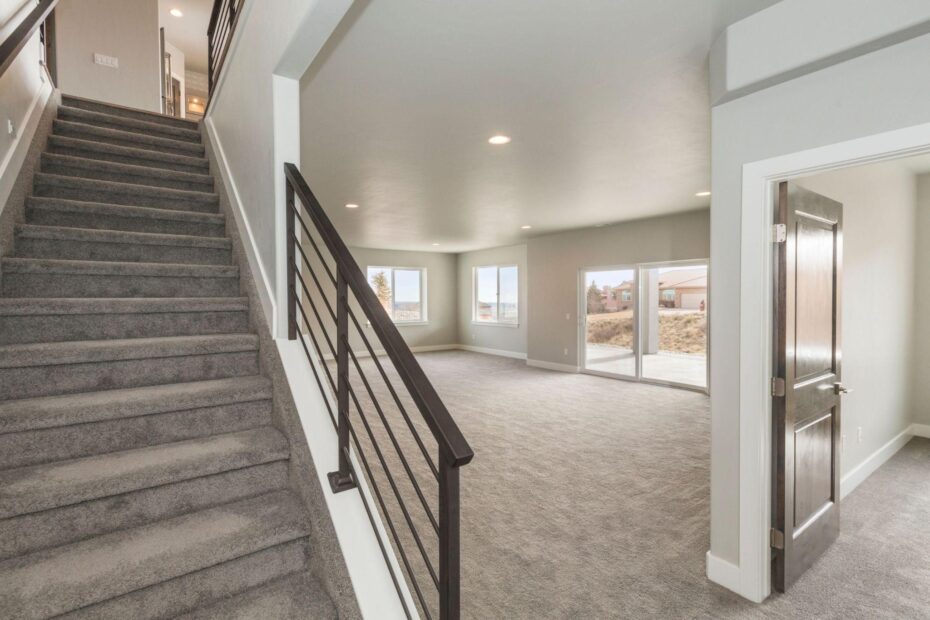Turning your basement into a cozy living space is a great idea, but subterranean spaces can be tricky to keep warm. Without the right heating solution, basements can remain persistently cold, detracting from their comfort and usability. At Jacques Family Construction, we have years of experience building fully functional basements across Northern Colorado, so here’s some tips for how to find the right heating solution in your basement.
Popular Basement Heating Options

Forced-air heating vent
Heating solutions are a core decision when it comes to basement finishing in Fort Collins and elsewhere in Colorado, where cold nights and winters can make it hard to enjoy your newly finished space. Here are some of the most popular heating options for basements:
Forced-Air Heating
A forced-air system is the most common type of heating system installed in basements, and it is likely the system you already have installed in your home. Forced-air heating uses a furnace to heat air and distribute it throughout the space via ducts and vents. It’s typically designed for whole-home integration (being scalable with further ductwork), so if you’re already using forced air for your upper levels, this could be a seamless solution for your basement.
Pros:
- Even heating: Forced-air systems distribute heat throughout the room and the entire house, making for a more uniform temperature.
- Easy integration: If your home already has ductwork, you can often extend the system to the basement without a huge overhaul.
Cons:
- Requires potential ceiling soffits: When installing ducting throughout a basement for a forced air system, most of the time sections of ducting will be installed below the ceiling height creating soffits within the basement’s finished space. In some instances, these soffits can detract from the aesthetic of the basement and make the space feel cramped due to the lower ceiling height.
- Uneven heating: Without careful planning of air supply locations, the heat can become uneven in certain areas, leaving cold spots.
Radiant Floor Heating
This system uses either piped heated water (hydronic) or electrical cables (electric) placed beneath the floor to radiate warmth upward, providing a gentle, consistent heat without any cold spots. While it has higher upfront costs, radiant heating creates the kind of cozy environment you’d expect from a spa.
Pros:
- Comfort: Radiant heat offers that cozy, even warmth that radiates up from the floor. Perfect for basement areas where you’re often barefoot.
- Energy efficiency: Since it operates at lower temperatures than forced air, radiant heating is generally more energy-efficient.
- Even heat distribution: The heat is more consistent because it’s distributed directly from the floor up.
Cons:
- Higher initial cost: Installation costs can be steep, especially for hydronic systems.
- Installation complexity: Installing radiant floor heating requires significant upfront planning and can be disruptive to existing flooring.
Baseboard Heaters
Baseboard heaters are small, wall-mounted units that heat the space either through electricity or hot water. They’re simple, affordable, and great for smaller areas like basements.
Pros:
- Affordable: They’re one of the most budget-friendly options out there.
- Easy to install: Baseboard heaters are relatively easy to install, even in existing spaces.
- Good for small areas: They work well in smaller basement spaces without needing extensive ductwork or major investments into the heating infrastructure. They take up minimal space and won’t require you to adjust your basement’s layout to accommodate them.
Cons:
- Less efficient: They can be more expensive to operate over time compared to other systems.
- Uses wall space: These units need space along the base of the walls, potentially limiting your design and furnishing options.
Ductless Mini-Split Systems
Ductless mini-split systems are heat pumps that provide both heating and cooling without the need for ductwork. These systems consist of an indoor unit and an outdoor compressor, making them ideal for basement areas that aren’t currently part of your central HVAC system.
Pros:
- Energy-efficient: Mini-splits are often very energy-efficient, as they heat and cool spaces without the waste that can come from traditional whole-home ductwork.
- No ductwork: This makes it a great option if you’re looking to avoid running ducts into your basement.
- Easy installation: Because they don’t require ducts, mini-split systems are easier and faster to install than other systems.
Cons:
- Higher upfront cost: The initial cost of purchasing and installing a mini-split system can be high.
- Requires proper placement: For maximum efficiency, the units need to be placed in optimal spots, which can be difficult sometimes due to basement layouts.
Other Factors to Consider When Choosing Basement Heating Options
- Size of the basement: Larger basements require more powerful systems to keep things warm and comfortable. A tiny basement might only need a small electric heater or one baseboard unit to stay cozy, while a sprawling finished space will need radiant heat or forced air.
- Budget: We all have a budget, but it’s important to consider both the upfront costs and the long-term energy savings. Radiant floor heating is dreamy and can save money in the long run, but it’s a substantial initial investment. Talk to an expert basement contractor and consider how much you’re willing to spend now versus over time on utility bills.
- Desired comfort level: If you’re after even heating, systems like radiant floor heating or forced air may suit your needs better than something like baseboard heaters.
- Existing HVAC system: If you already have a central heating system, check if your basement can be easily integrated into it. Extending your ductwork could be simpler (and cheaper) than installing standalone baseboard or mini-split systems.
Jacques Family Construction – Northern Colorado’s Basement Experts
With so many options available, the right heating choice for your basement will depend on your needs, budget, and existing setup. Contact Jacques Family Construction today for expert advice and exceptional basement remodeling services!
Get Started
Have questions about our services or a project in mind? We're here to help! Whether you're looking to bring your ideas to life or need expert advice, our team is ready to assist you every step of the way. Let's collaborate to turn your vision into reality.
